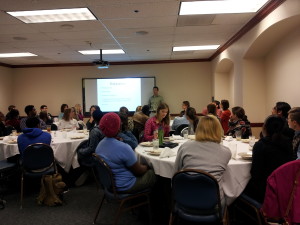We have much more to do and your continued support is needed now more than ever.
Farm to Table: Sustainable Food in Higher Education
On April 5, Campus Ecology’s Georgia Campus Sustainability Network (GCSN) hosted a workshop on sustainable food for the our Spring Topic Specific Workshop series. Thirty-seven participants from colleges and universities across the state came to Georgia Southern University to learn and brainstorm on sustainable dining at their institutions. These attendees included students, faculty and administrators.
The ideology of “sustainable dining” is a fairly new concept on campuses. While students and universities have been focusing on energy efficiency and policy, of course important issues, there has been another looming shift in our country where people are beginning to focus on their food and what their body intakes. We’re not just talking calorie counting, but examining what farmers and food processors put in the things we eat. In the light of this shift, students are demanding their school dining services think about these things as well. Additionally, how far food travels is a considering factor. Reducing the carbon footprint of your campus includes decreasing the distance your food is travelling from “Farm to Table”. Basically, buying local, naturally grown produce and naturally fed meat is important for the sustainability of human health and the health of our planet. And of course, in a still largely agricultural state like Georgia, opportunities for this should not be hard to find.
Friday’s workshop began with a keynote from K. Rashid Nuri, founder of Truly Living Well Center for Natural Urban Agriculture. Truly Living Well is an organization with two community gardens in Metro Atlanta’s urban neighborhoods. However, they do much more than gardening. TLW has a number of programs educating Atlanta and the state community on urban agriculture. Nuri came and gave a very inspirational speech on his background, starting Truly Living Well and his opinions on urban farming. We were reminded of why we were there and why this work is so important.


“It was very inspiring to see others who are breaking new ground in the ‘good food’ movement. It was such a pleasure to hear stories about the creative work colleges and universities are doing across the state, in the area of sustainable food. Momentum for this movement is growing, and it’s very exciting!”
I believe this was the necessary guidance needed to drive sustainable food initiatives forward on Georgia university campuses. In the next year, my plan is to organize strategic planning meetings with students, administrators, and university dining staff together to brainstorm how to tailor this new venture to their individual campuses.





















